Presidential Finalist Neil MacKinnon Shares His Dreams for FGCU’s Growth
The Third of Four Finalists to Host Public Forums
Dr. Neil MacKinnon is hosting 3 public forums to converse with students, faculty and staff about FGCU’s future.
April 20, 2023
Neil MacKinnon, Ph.D. will attend three public forums held in the Cohen Student Union on April 20 to give students, faculty and staff insight into how he would aid FGCU’s growth as president with knowledge he’s collected from working in other higher education institutions.
MacKinnon is the current provost and executive vice president for Academic Affairs at Augusta University (AU) in Georgia. He is the third of four finalists to attend public forums for the continuation of the fifth presidential search.
Kristen Vanselow, the president of FGCU’s Staff Advisory Council and assistant vice president of Innovative Education and Partnerships, moderated the 8:30 a.m. to 9:30 a.m. public forum.
In MacKinnon’s opening remarks, he said that FGCU fits his mission in life because of the university’s core values and how they align with his personal values.
“To me, one of the best roles or most important roles that any university president can play is to create an environment where faculty, staff and students dream,” he said. “What’s the future? But then more importantly, also help those individuals achieve those dreams and so certainly that would be my goal here would be, to dream alongside you and more importantly, help you accomplish your dreams.”
He said in the next five years, he would want to move FGCU from tenth place to sixth place in performance based budgeting, implement co-op internships for all undergraduates, increase endowment to $250 million and to receive additionally state funding, and to double the number of out of state and international students, while also forming international partnerships.
MacKinnon already has plans on how to start these initiatives if chosen to be FGCU’s fifth president.
“Now I realize that the mission of Florida Gulf Coast University is as a regional comprehensive university and your relationship to Southwest Florida is tight, it’s deep, and I would not want to change that,” MacKinnon said. “But I would argue at 25 years, now is the time to spread your wings, you know, sorry for the bad pun, and to think a little bit broader, right? And not that you’re not doing that now.”
A Team of Leaders
Moderator Vanselow asked how MacKinnon would develop a team of leaders at FGCU.
MacKinnon said a presidency should not be a one man show because that would be a recipe for disaster in an university environment where shared governance is critical. He said before he started at Augusta University, he asked his 21 ‘direct reports’ their SWOT analysis (strengths, weaknesses, opportunities and threats) and what motivates them.
“I have some, my direct reports, my team, that they’ve been in position for several years, they don’t see themselves moving from that and that’s fine,” MacKinnon. “There might be other areas for professional growth. Others view this kind of as a career ladder. So I think for me, it’s important to understand that, I think for those that do want to grow professionally, to make sure that we have opportunities for that at the university.”
Women Representation in Leadership
Lisa Johnson, the associate vice president of Enrollment Management, asked MacKinnon what he would do to broaden candidate pools to increase women representation in leadership. Johnson said that every dean and head of a department is male, even though there are women in other roles across campus, but few in leadership roles.
MacKinnon said that as a father to three teenage girls, he understands this on a personal level.
“I think we can do a better job of course, supporting everyone but particularly females in the academy because we realized that women have these special kind of pressures. I think part of it would be something like the Provost Faculty Fellow Program.”
He said he knows that women have a unique challenge of work and life balance. He said that FGCU’s on-campus daycare itself is a tangible way to eliminate some of the challenges that professional women face.
“I would be interested in seeing, what are those other barriers here that prevent your female leadership as far as taking that next step? You know, going from a department chair to a dean, or from a director to a VP, what are those barriers?,” MacKinnon said. “Or what’s the next thing we can do, like daycare to support our female leaders?”
Sustainability: Environmental and Financial
Professor Robert Kenny asked what MacKinnon’s definition of sustainability is. MacKinnon replied environmental sustainability and financial sustainability.
He said he can see FGCU’s dedication to environmentally sustainability and the hands-on experiences that students receive by accessing the Gulf. He mentions financial sustainability because as president, endowments are crucial to benefit the future students of FGCU.“It really has a core value of altruism, thinking about others before yourself,” MacKinnon said.
Florida’s Political Climate in Higher Education
Dan Bacalzo, program coordinator and associate professor in the Bower School of Music and the Arts, asked how MacKinnon will face the higher education challenges in Florida, specifically towards limitations surrounding HB 999, freedom of speech, critical race theory, gender inclusion and LGBTQIA+ students.
MacKinnon said he has experience in the Arizona state government, not as an elected politician, but still has a clear understanding of the inner workings.
“In Georgia as well, Florida is not the only state that’s highly politicized,” MacKinnon said. “Just for example, our chancellor was a former governor and was secretary of agriculture for President Trump. So if you talk about politicized environment, right, our own Chancellor, that’s the definition of a political background.”
He said that if HB 999 gets passed and goes into effect while he’s president, he must abide by it, but how he implements it is crucial. He still wants to show support to the affected departments.
“If I look at your core values and principles, diversity is right there, you clearly stated that in fact, a point of pride for a university is a factor you’re almost at HSI, right, that’s gonna happen and my sense, is that I don’t think there’s any pushback against that,” MacKinnon said.
Budget Distribution
Andi Clemons, the director of Academic Affairs, Administration and Budget, asked how MacKinnon would grow university funding and how current operations would be evaluated to ensure funds are used effectively.
MacKinnon said AU works with an incremental budget, meaning that the university is given the same budget as the previous year with slight modifications. He also experienced the Responsibility Center Management model (RCM) at the University of Cincinnati, where funding is based on enrollment and would go to the colleges. He said there are pros and cons to both.
“To me though the bigger thing and this regardless if it’s incremental, or RCM, or hybrid in between, is transparency,” MacKinnon said.
He said that at AU, the budget meetings are live streamed and every dean and head is present. And if after the decisions are made and a department doesn’t get its desired funding, the chief business officer calls them and discusses it with them.
Relationship with the Board of Trustees
An anonymous submitted question asked MacKinnon how he views being a Board of Trustee and university president in Florida. MacKinnon said this relationship needs to be solid.
“Here’s the thing, I think sometimes we think of [the] Board of Trustees, maybe in a negative light, just a layer of bureaucracy, these are people maybe not connected to university. I feel differently, these could be your 13 best advocates for what’s going on,” he said.
Student Freedom of Speech
An anonymous submitted question asked MacKinnon how he would engage with criticism and communicate when students disagree with him or his office. MacKinnon said he would welcome that.
At AU, he shares they’ve added a checkpoint in every course 5 weeks in to receive feedback from students through a six question survey about how they’re feeling in the class, instead of at the end of the semester.
Research Experience
Student Cameron shared he is a non-traditional student at FGCU studying data analytics and asked what research MacKinnon has done that’s the most innovative or that he’s most proud of.
While working in Canada, he was looking at errors, including cover ups, made in community pharmacies.
“If you’re doing something innovative, I would say, you know, not that you’re trying to intentionally tick people off but you’re gonna get some kind of feedback and usually negative because you’re doing something innovative, something people haven’t done before,” he said. “And so we were discovering problems that no one else on the planet was reporting and that’s changed since then.”
Diversity, Equity and Inclusion
Dr. Chris Blakely, assistant vice president and dean of students in Campus Life and president of the Black Faculty and Staff Association, shared that research shows people of color within universities are often targets of race-based discrimination and harassment at predominately white institutions like FGCU. He asked MacKinnon what he would do to ensure FGCU’S BIPOC community is respected.
MacKinnon said that he has become a stronger leader because of the diversity in his teams as he’s made his way through universities. MacKinnon shared that while working at the University of Arizona, he was involved in outreach to local tribal communities.
“So 47% of [AU’s] undergraduates are students of color, the largest being African American in Georgia, where we are, as I mentioned earlier, diversity equity inclusion follows under me,” MacKinnon said.
He also shares that AU started the African American Male Initiative, where students receive mentoring from other students to create a sense of community. The Faculty Inclusive Excellence Initiative was also created during his time at AU.
Supporting Arts and Sciences
Dr. Glenn Whitehouse, associate professor and dean of the College of Arts and Sciences (CAS), asked MacKinnon how he would direct funding and support student recruitment within the CAS. MacKinnon said that donor relationships are key in order to raise funding within each college.
MacKinnon said he’ll have an active presence on campus in all areas of academics because presidents “can’t have favorites.”
“Understanding what are the dreams and aspirations of the faculty in those units? And again, how as a president can I be an advocate for those areas?” MacKinnon said.
Being a Team Player
An anonymous submitted question asked MacKinnon what his leadership style is. MacKinnon said being humble and wanting to learn things, passion, and having a smart emotional IQ describes his leadership style.
MacKinnon references the book “The Ideal Team Player” by Patrick Lencioni for these descriptors.
MacKinnon said in his closing statement that he sees promise at FGCU and that the community engagement in the public forums is a good sign to him that stakeholders care about FGCU’s future leadership. His last forum of the day will be from 4 p.m. to 5 p.m. in the Cohen Student Union, room 201.
Public comments are encouraged through a survey that will remain open until Friday, April 28 at 5 p.m. All submissions are subject to public records and will be reviewed by the Board of Trustees before final interviews take place on Thursday, May 4 in the Cohen Student Union.




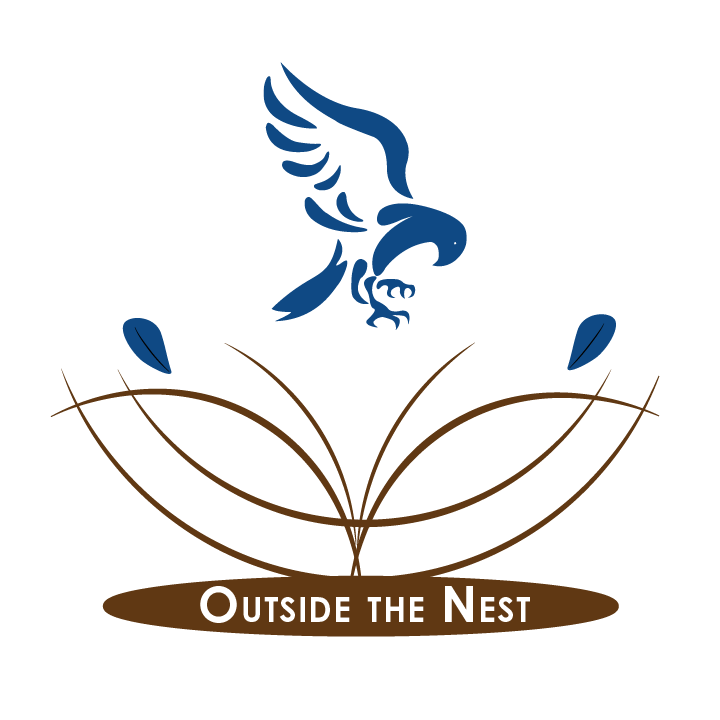
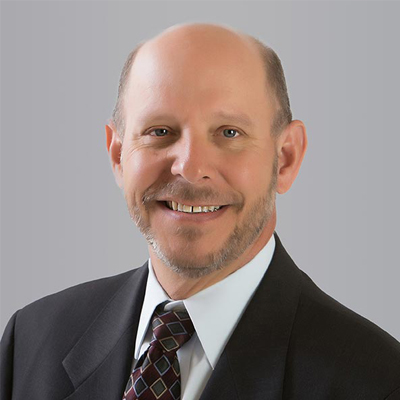




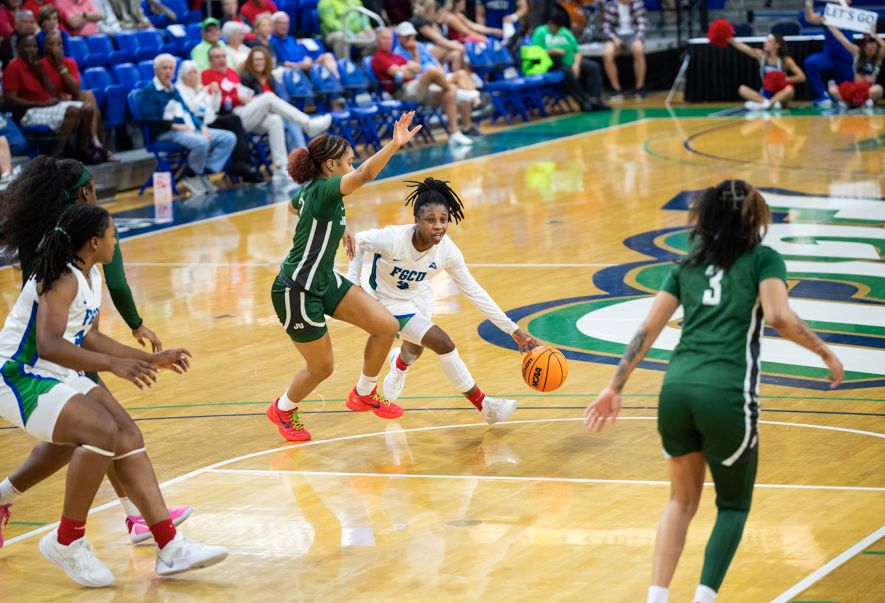












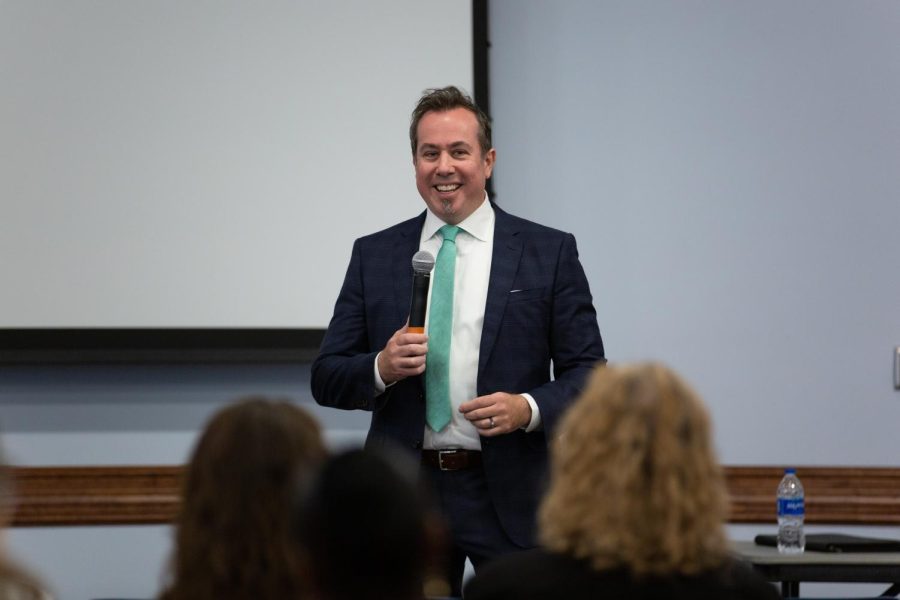
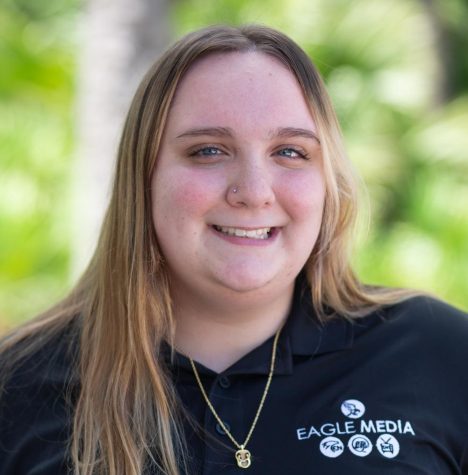
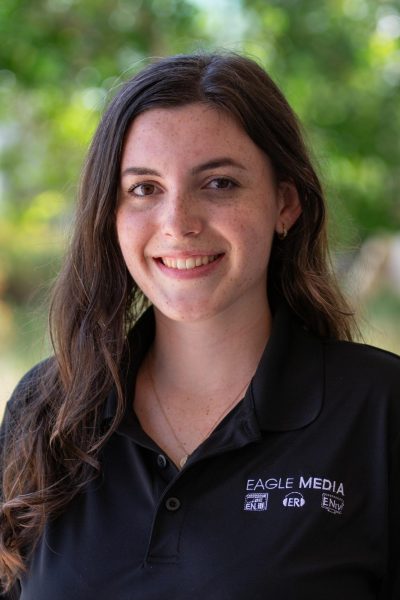

Jaxon • Apr 23, 2023 at 12:22 pm
Wasn’t really impressed, not experienced, seemed to be a people pleaser and someone who would be afraid to rock the boat.